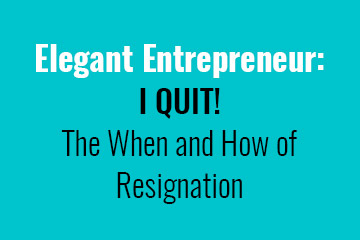
I have accepted numerous resignations in my time as a business owner and manager, and the nature and tone of those resignations is as varied as the people working in, and with, my business over the past twenty years. After years of experience in this regard, I have concluded that, while there are many ways to quit your job, there are definitely right ways and wrong ways to take on this process.
In this article, I will share my thoughts from an employer’s perspective in hopes of making the resignation process better for all concerned. As an employee, one might not believe there is a reason to do this ‘the right way’. After all, you are leaving the company. Why would you care about your employer’s feelings?
But, it isn’t so much about feelings as it is about finishing what you started in a professional way so that you don’t:
- Close the door on future relationships, referrals and learning opportunities
- Damage your own professional reputation and risk ‘bad press’ in your industry
- Lose the opportunity for continued professional growth and maturity
There are many things to consider, once you have decided to leave your job. Before you outline your plan, here are a few thoughts that might help you tender your resignation ‘the right way’.
When
The standard lead-time for a resignation is one to two months in India, unless you are on a management or executive team, in which case an employment contract or other corporate policies might dictate a longer lead-time. Regardless of the policy, I would encourage you to let your employer know as soon as possible. In most cases, a manager appreciates the advance notice and the opportunity for a smooth transition.
In small companies, the loss of one employee can send the business into a spiral. The more notice you give, the easier the transition and the more grateful the employer will be. We’ll talk later about why you want your employer to be grateful!
How
Unless you are a remote employee who works on the other side of the world, don’t resign by email. Even If you are working remotely, you should at least call your employer to talk about your resignation. Make an appointment to talk. Don’t just drop in, when your manager is busy, or about to go into a meeting.
If you are AT ALL nervous about the resignation (and many people are), jot down some notes so that you are prepared to discuss all the points you want to make. Even if you aren’t nervous, you should consider making some notes; just to be sure you discuss all appropriate issues and work with your manager to establish an interim plan.
Draft a simple, concise, professional resignation letter to deliver to your manager on the day of the meeting. The letter should not outline grievances or provide an emotional venting process for you. If you need to do that, do it for yourself and, after you have gotten it out of your system, destroy the letter.
During the Meeting
Under NO circumstances should you allow yourself to engage in an emotional outburst! No matter how difficult your time or relationship with the company may have been, you should make your last official interaction a positive one. Avoid accusations, yelling, throwing things and definitely avoid violence! These may seem like obvious cautionary statements but we have all seen the viral internet videos of disgruntled employees going berserk. It might feel good at the moment to get things off your chest but this kind of behavior can only hurt you in the long run and in hindsight you are likely to be embarrassed and find yourself in a defensive position trying to explain your behavior and convince others that your manager ‘deserved it’. Take the high road and be mature. Don’t let a ten-minute tirade damage your professional career. No matter what you think: people are watching and judging your behavior and that can affect your career.
If you feel strongly about telling your manager about honest issues in the organization, about circumstances that caused you to leave, do so professionally (that’s where the notes will come in handy). Carefully outline the issues without accusing or attacking anyone. Think of it as if you were telling your manager about issues that someone else on your team has experienced. You are simply laying out the facts. Make suggestions on how to improve or change things, what policies the business might want to change. Take a productive, collaborative approach. Even on your way out the door, you can affect change. You’ll feel good about the exchange, and it may take some of the sting out of the bad experiences you had while you were employed. Remember that your comments may change nothing. But, at least you will have tried! You deserve honest feedback and so does your manager!
Now that we have talked about the worst-case scenario, let’s assume you are leaving on good terms. You will want to tell your manager why you are leaving, e.g., a better opportunity, relocation, a chance to explore a different type of career, going back to school. Be honest. If you enjoyed your time at the company, tell your manager how you feel. Give specific examples about how your team and/or your manager supported you. Be mature and forthcoming!
Whatever you do, don’t lie! Tell the truth about why you are leaving and where you are going – even if you are going to the competition. As long as your contract does not preclude a move to a competitor, it is better to be honest. Remember that you will have to provide references so, eventually, your manager will know where you are going. Better to give your company time to prepare for the reference than to blindside them with a cold call. Resist the temptation to remove your current company from your social media and professional network profiles. If you think this action will avoid awkward reference requests, you are in for a surprise. It is never wise to lie or attempt to hide the truth. It will always catch up with you and your new employer will judge you accordingly.
I hope this article has given you some insight into how an employer views the resignation process. The second article in this special Elegant Entrepreneur series, is entitled, ‘I QUIT! What Happens After You Resign?’. It provides further tips on how to maximize your remaining time in the company and ensure that your resignation and professional approach will leave a great impression and improve your career opportunities in the future. I encourage you to read that article and to use these articles as a blueprint for professional resignation. It will protect you and your career.
Original Post : I QUIT! The When And How Of Resignation!










